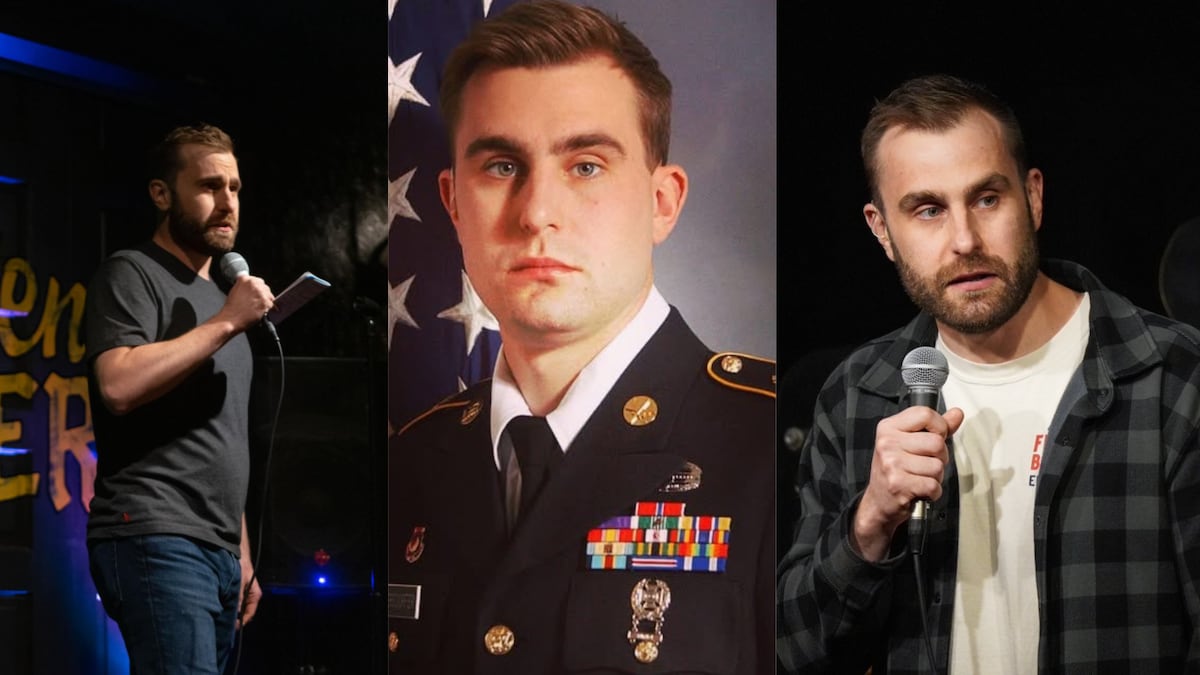As a comedian, you never forget the first time you bomb. For me, it wasn’t on stage.
I was in southern Afghanistan in May 2014 when a vehicle-borne improvised explosive device detonated near me while covering a routine patrol as a public affairs specialist.
It was something I had a dozen times before, but in a flash I was on my back, ears ringing, lungs full of dust.
I don’t remember the sound — just the silence that came after. That was the first time I learned what silence was — that unique brand that only occurs when your brain is trying to reboot and you’re unsure what may or may not be broken.
The blast knocked me out cold. When I came to, nothing was where it had been. The explosion left me with a traumatic brain injury and partial deafness in my right ear, with tinnitus that still rings to this day. I deal with memory loss, light sensitivity and sudden moments of confusion or panic that attack without warning.
I am fortunate to be alive. Not everyone who has gone through the same experience can say the same. That fact followed me home and into civilian life. It followed me into comedy.
After I was medically retired from the Army, I felt unmoored. I didn’t want to be thanked for my service. I wanted to feel something again — other than adrenaline and dread. I wanted to laugh. I wanted to make other people laugh.
So, I started writing, chasing the rhythm of a good joke like I used to chase good light for a photo while convincing people I was more than just a POG. (Writing that last sentence and saying it out loud, I realize that’s probably the best joke I will ever tell.)
My civilian work eventually took me to Chicago, where I enrolled at The Second City, a comedy institution where the entire curriculum is built around turning pain into timing, a place where you’re not only encouraged but expected to fail. But even with all that structure and guidance, and despite learning from the best and being repeatedly told I was capable and that my story mattered, it still wasn’t enough.
I was scared — terrified, actually. Not of the stage, but of being exposed, of being seen, of letting people in on what the war had done to me.
So, I took a break — a long one at that. I told myself I needed time to write, reset and work on new material. But the truth was more simple: I didn’t know who I was without the uniform, and I wasn’t sure if people would laugh at what was left.
For a long time, I convinced myself I hadn’t earned the right to be on stage. Like telling jokes meant I wasn’t honoring the people who didn’t come home. Or that getting a laugh somehow cheapened what had happened.
But here’s what I’ve learned as months went by: if I survived, I’m still allowed to speak. I’m allowed to create. I’m allowed to be more than what happened to me.
Two years ago, I got back on stage. There wasn’t some profound moment that caused me to do so. I just went out and did it, embracing the fear that had gripped me for so long. With the encouragement from friends and a refresher with the Armed Services Arts Partnership, I slowly started to find my comedic voice again.
Strangely enough, performing again reminded me of being on a mission. You rehearse. You plan. You step into a high-stakes environment where nothing is guaranteed. And then you execute.
The audience, like a patrol route, is unpredictable. You adjust. You move. You adapt. You get through it or you don’t — but you’re changed by it either way.
When I bomb now, I don’t panic, because — without sounding too cliche — I know what actual bombing is. I’ve felt the pressure change before an explosion. I’ve seen the color drain from the world. So, when a joke doesn’t land, I breathe. I wait. I reset. I’ll write something better next time.
What that VBIED taught me — besides basic blast physics — is that timing matters and silence isn’t always failure. Sometimes it’s the space before the punchline.
It also taught me people are always watching how you carry yourself when everything goes wrong. In combat, it’s about bearing. In comedy, it’s about confidence. My pace on stage is a reflection of that. It’s slower, calculated and rehearsed. You don’t have to pretend you’re invincible, but you do have to show the crowd you’re still in control — even when the wheels are coming off.
I used to think comedy and combat were opposites. The two could never co-exist. One is chaos, the other is craft. One is pain, the other is relief. But now I see them as siblings. Both rely on rhythm. Both require you to say the unspeakable out loud. And each demands you be fully present in moments where the stakes are high and the outcome is unknown.
This May will mark 11 years since I was blown up. And while the scars remain, so does the voice. The one that says, “You’re still here. Say something useful.”
Some nights that voice tells a joke about memory loss or PTSD. Other times it gets on stage and tries not to flinch at the light. And then during others it wonders how many people in the audience have their own hidden war stories.
But every night, that voice remembers that laughter is proof of life. And that after everything, I’m still standing.
Still up. Still writing. Still here.
Observation Post is the Military Times one-stop shop for all things off-duty. Stories may reflect author observations.
Read the full article here








